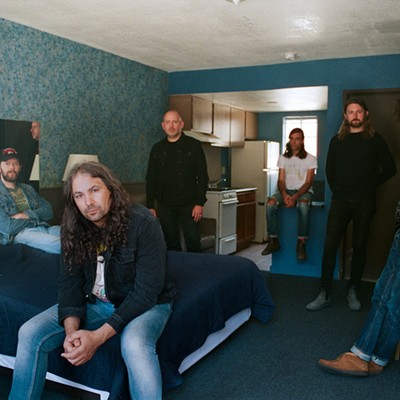
America’s musical roots are entrenched firmly in the blues. From the field hollers of slaves to the guttural Southern gospel of the late 19th century, early blues drew upon feelings and sounds that later paved the way for much of today’s popular music.
It’s appropriate, then, that Luella and the Sun hail from Nashville, Tenn., a city famous for its role in the development of roots-minded music. On display Saturday night at Kamps 1310 Lounge, the group’s songs are unabashedly bluesy, yet traces of other traditional, distinctly American sounds — everything from zydeco to hip-hop — have influenced the trajectory of its sound.
It’s a mixture that, according to guitarist Joe McMahan, is attributable to Nashville’s uniquely expressive culture.
“The climate here right now is so fertile, vibrant and wide-open. You can go wherever your heart takes you,” McMahan said. “In that way, it lets us feel like we can be as weird as we want. We can let our freak flag fly.”
With the recent rise of acts like The White Stripes and The Black Keys, an influx of blues-rock revivalism has permeated pop music — a cause for celebration among the genre’s traditionalists. Some, including McMahan, see this phenomenon as a pushback to the more polished, studio-sweetened songs now dominating the airwaves.
“A lot of people are able to make really slick-sounding records in their bedroom, and I think there’s a large percentage of the population that becomes a bit bored with that,” he said. “The raw urgency and the primal nature of [the blues] is so fresh compared to the giant production in pop music where everything is perfect.”
While Luella and the Sun share certain commonalities with those in the category of contemporary revivalists, the band’s tracks often shed light on something largely neglected: the genre’s rich vocal heritage.
And it all starts with its eponymous front woman, whose warm wail offers a fervent contrast to McMahan’s grimy guitar licks.
“She’s a blues singer, but she’s not a clichéd blues singer,” he said. “I’m always in complete awe of her singing abilities and stage presence.”
Others have been, too; praise has been mounting since the quartet’s formation last year, without even a proper album to its name. Given each member’s affinity for the eclectic and their tried-and-true, bare-bones approach, it’s easy to see why heads are turning.
By staying true to these roots, McMahan said the hype — and the notion of what a blues band is supposed to sound like — will acquiesce to something far more significant.
“We want to bring elements of important American music, in a roots way, into the modern world,” he said. “Somehow in the past 30 years, blues has kind of turned into this loud, guitar-soloing music. We want to bring back that element where it was more about the song and the lyric, and what that made you feel.”
Hey! Read This:
• Fiawna Forté interview











